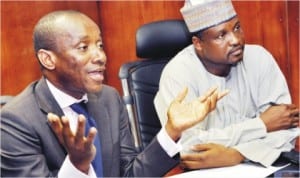Business
FG Renews Commitment To Automobile, Manufacturing
The Federal Government has renewed its commitment to creating policies that would enhance the development of the automobile and manufacturing sectors.
The Minister of Industry, Olusegun Aganga, said this in Lagos yesterday at a business roundtable organised by the Sam Ohuabunwa Foundation for Economic Empowerment.
Aganga, represented by Director-General, Standard Organisation of Nigeria (SON), Dr Joseph Odumodu, said the automobile industry had boomed in the last six months than the past 30 years.
He attributed the growth to the alignment of the private sector and stakeholders in the industry to government policies for the sector.
“The automobile sector has grown in the last six months than the past 30 years.
“The reason is not far from the cooperation of the private sector and stakeholders with the National Industrial Revolution Plan (NIRP).
“A major challenge, however, is that the value chain on raw materials have not been properly linked because major manufacturers still import batteries, lubricants and so on.
“Presently we are meeting with stakeholders like INNOSON, discussing the way forward for the sector,” he said.
Aganga also urged small and medium business owners to plan their businesses on a long term budget cycles rather than a short time.
“By 2050, it is estimated that Nigeria’s population will be one of the largest in the world, competing with China.
“This is a factor that SMEs and local manufacturers can leverage on, on a long term basis,” he said.
He also urged private sector practitioners to establish more training centres for varieties of professionals to cover the human skills gap to boost the manufacturing sector.
He said that the federal government’s collaboration with the United Nations International dcevelopment Organisation (UNIDO) to boost skill gaps and train professionals to compete with foreign counterparts was still in place.
Also speaking at the event, the Minister of Finance, Dr Ngozi Okonjo-Iweala, said there were so many beneficial government policies that Nigerian entrepreneurs had yet to access.
Okonjo-Iweala, represented by a director in the ministry, Mr Gabriel Ajudua, said the N100 billion textile industry intervention fund had lacked investors coming forward for investment loans.
She also said that the federal government was working on the partnership with private sector to provide 750,000 jobs through the agriculture and manufacturing sector.
The Proprietor of the foundation, Sam Ohuabunwa had earlier said the event was a platform for government officials to feed entrepreneurs of opportunities available through government policies.
The theme of the forum is “Optimising Opportunities in the Federal and State Budgets”.
Business
Fidelity Bank To Empower Women With Sustainable Entrepreneurship Skills, HAP2.0
Business
President Tinubu Approves Extension Ban On Raw Shea Nut Export
Business
Crisis Response: EU-project Delivers New Vet. Clinic To Katsina Govt.
-

 Education4 days ago
Education4 days agoElga boss tasks law students on academics strides
-

 News1 day ago
News1 day agoAmend Constitution To Accommodate State Police, Tinubu Tells Senators
-

 Politics1 day ago
Politics1 day agoSenate Urges Tinubu To Sack CAC Boss
-
Business1 day ago
President Tinubu Extends Raw Shea Nuts Export Ban To 2027
-

 News1 day ago
News1 day agoDisu Takes Over As New IGP …Declares Total War On Corruption, Impunity
-
Business1 day ago
Crisis Response: EU-project Delivers New Vet. Clinic To Katsina Govt.
-

 Business1 day ago
Business1 day agoPENGASSAN Rejects Presidential EO On Oil, Gas Revenue Remittance … Seeks PIA Review
-
Business1 day ago
FG Pushes Cassava Bioethanol Drive To Boost Industrial Growth


